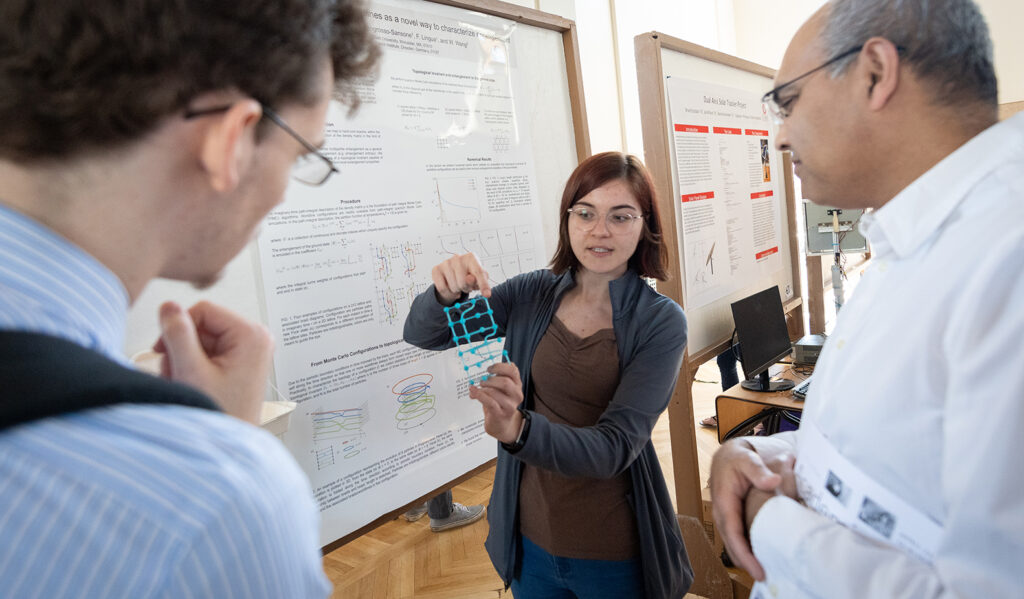In-person Fall Fest returns on Friday, Oct. 29

What do Clark students do in a typical academic year?
- They synthesize the writings of Samuel Beckett and William Shakespeare for a contemporary audience.
- They investigate the impact of altitude on wind chill temperature.
- They recreate human cancer-causing mutations in a fruit fly.
And that only scratches the surface. These projects and many more will be on full display when Fall Fest 2021, Clark’s autumn celebration of student research and creative work, returns on Friday, Oct. 29, from 1 to 4 p.m. inside Tilton Hall in the Higgins University Center. The annual event allows students an opportunity to showcase the projects they’ve produced under the mentorship of Clark faculty, spanning multiple academic disciplines and a wide variety of topics.
After a brief hiatus last year due to COVID-19 restrictions, more than 50 Clarkies are gearing up for this in-person community event. Posters and demonstrations will be featured in Tilton Hall, and oral presentations and panels will take place in the Shaich Family Alumni and Student Engagement Center.
Students from the Becker School of Design & Technology at Clark University — who are participating in their first Fall Fest — will share gaming displays that take us into the worlds of 3D modeling and game art, and offer the promise of adventure. The titles “Upheaval” and “VR Racing Game” suggest motion, disruption, and speed. “Perfect Adamantium Helmet of Super Durability” — with its sly Marvel Universe reference to the fictional metal alloy that shapes Captain America’s shield and Wolverine’s skeleton — is ready for its Clark debut.
The oral presentations begin at 1 p.m. in ASEC 111, and will feature an eclectic mix of topics, from new ways of looking at history curricula to coping with, and overcoming, procrastination in daily life.
Two student panels to be held in ASEC 202 reflect on social movements of yesterday and today: “Power to the People: A Black Power Movement City-Study, 1960s-1970s” (1:30 p.m.), and “Not Everything is in Black or White: The Complexity of Latinx Identities” (3–4 p.m.).
Artemiy Leonov ’24, a psychology and biology major, is looking forward to presenting the study he and Professor Justin Laplante are conducting into the nature of procrastination.
Leonov and Laplante recruited 15 video game enthusiasts, who were then separated into three groups with specific instructions to follow over the course of two weeks: One group could continue gaming, but were required to take 10-minute breaks between games; a second group was deprived of all gaming; and a third group could continue playing with no changes to their gaming routines.
The aim, Leonov explained, was to evaluate how responsive the participants were to accomplishing other life tasks depending on how they interacted with games. For instance, did their level of procrastination for completing schoolwork or exercising decrease if their gaming regimen was altered? Was their overall productivity, as well as their mood, affected given the restrictions (or lack of) on their particular group? Without revealing too much here, Leonov noted that some participants “became very productive and very angry” while others adopted a more mindful approach to how their gaming patterns impact their other roles and responsibilities.
With the support of a Tamara Gay Walker Award, Luke Pound ’22 worked over the summer to translate two plays: “Waiting for Godot,” by Samuel Beckett — from the original French into English, and “Much Ado About Nothing,” by William Shakespeare — from English to Spanish. “As these plays are famous pillars of the theatre canon, translating them from a contemporary perspective would make them more accessible today,” Pound said.
“I was inspired to do this project by three classes I took last year: Theatre Workshop in French with Professor Beth Gale, Spanish Translation Workshop with Professor María Acosta Cruz, and Advanced Playwriting with Professor Gino DiIorio,” Pound added. “Learning translation techniques, analyzing French plays, and completing my first full-length play all contributed to the idea of translating plays on my own.
“I was drawn to ‘Godot’ and ‘Much Ado’ as they are some of my favorite works, but also because they had themes relevant to the present day,” Pound said. “Waiting for something that will never come, making a big deal out of nothing — many of these aspects had startling connections to pandemic life.”
Lamisa Muksitu ’22 and Penelope Kogan ’22 spent their summer working with Mishy Lesser, learning director at the Upstander Project, to prepare a teachers’ guide for Bounty, a short film about the 1755 Phips Proclamation which called on members of the Massachusetts-Bay colony to pursue, captivate, and kill members of the Penobscot Tribe, and offered a bounty for their scalps or bodies of their victims.
Muksitu and Kogan will present their research at Fall Fest and will also participate in a panel discussion with Lesser in November as part of an Especially for Students Lecture organized by Professor Shelly Tenenbaum
Muksitu noted that while her work at the Upstander Project strengthened her desire to pursue a career in research, “the field still has a long way to go in terms of inclusivity and accessibility.”
“I believe that academia must be reconstructed to make well-deserved space for indigenous peoples and people of color,” Muksitu said, adding that projects like these serve as important first steps.
Kogan, who plans to complete her master’s in international development and social change, said her experience re-emphasized the importance of historical context when studying areas of conflict.
“This internship has not only taught me how to dig deep within a history, but it has taught me to look for stories of resistance as well – even into the present day,” she said.
Fall Fest is sponsored by the Office of the Dean of the College.


